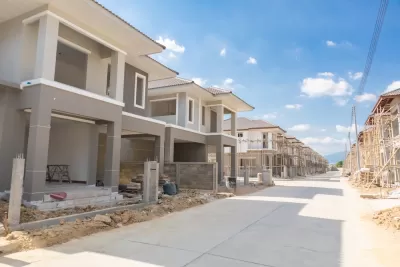The American Planning Association and the National League of Cities have announced a new partnership to find and implement solutions to the national housing affordability crisis.

The National League of Cities and the American Planning Association (APA) this week announced a new Housing Supply Accelerator in response to the worsening housing affordability crisis in the country. The announcement came within a few days of a report that the average national rent-to-income ratio reached 30 percent for the first time at the end of 2022.
The two organizations are working in “to improve local capacity, identify critical solutions, and speed reforms,” according to a press release from the APA. The press release specifically notes the role of local governments and planners in meeting housing demand. “The Housing Supply Accelerator will help localities do more with their housing dollars and maintain their efforts even after these one-time programs wind down,” according to the press release.
A recent article by Patrick Sisson in Planning magazine lays out the case for zoning reform, undoing the strict prohibitions of multi-family housing and requirements that enabled the car-centric sprawl of the 20th century planning status quo, as a critical solution for the housing affordability crisis in the United States.
Expect more announcements in the near future. The APA promises to reach out in the coming weeks to key housing supply stakeholders, housing association partners, and housing policy partners to participate in the Housing Supply Accelerator.
News coverage of the Housing Supply Accelerator is available from Smart Cities Dive.
FULL STORY: Housing Supply Accelerator

Planetizen Federal Action Tracker
A weekly monitor of how Trump’s orders and actions are impacting planners and planning in America.

Chicago’s Ghost Rails
Just beneath the surface of the modern city lie the remnants of its expansive early 20th-century streetcar system.

San Antonio and Austin are Fusing Into one Massive Megaregion
The region spanning the two central Texas cities is growing fast, posing challenges for local infrastructure and water supplies.

Since Zion's Shuttles Went Electric “The Smog is Gone”
Visitors to Zion National Park can enjoy the canyon via the nation’s first fully electric park shuttle system.

Trump Distributing DOT Safety Funds at 1/10 Rate of Biden
Funds for Safe Streets and other transportation safety and equity programs are being held up by administrative reviews and conflicts with the Trump administration’s priorities.

German Cities Subsidize Taxis for Women Amid Wave of Violence
Free or low-cost taxi rides can help women navigate cities more safely, but critics say the programs don't address the root causes of violence against women.
Urban Design for Planners 1: Software Tools
This six-course series explores essential urban design concepts using open source software and equips planners with the tools they need to participate fully in the urban design process.
Planning for Universal Design
Learn the tools for implementing Universal Design in planning regulations.
planning NEXT
Appalachian Highlands Housing Partners
Mpact (founded as Rail~Volution)
City of Camden Redevelopment Agency
City of Astoria
City of Portland
City of Laramie





























